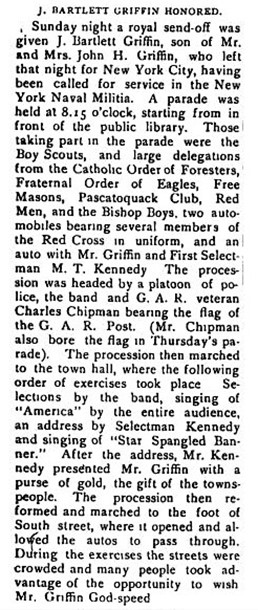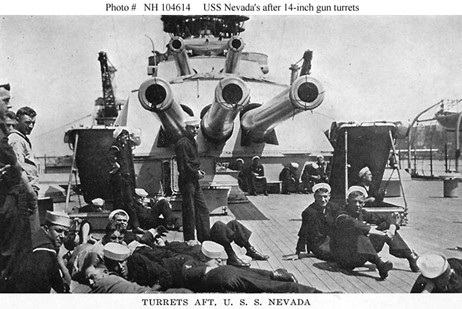
US Navy Lt. James Bartlett Griffin
During WW I James B. Griffin was a lieutenant in the Navy; following graduation from Annapolis, he served aboard the USS Michigan and the USS Granite State involving naval convoy missions. When he registered for the draft he was a law clerk with Alger and Ayers in New York City.
 An article from the Sep 28, 1917 Newmarket Advertiser details the sendoff that many young men received went they went off to fight in the Great War. James’s was especially well attended as everyone in town knew him. All through high school he could be seen in his father’s hardware store on South Main Street. During the war, he wrote letters home; these were published in the Newmarket Advertiser, and are appended below.
An article from the Sep 28, 1917 Newmarket Advertiser details the sendoff that many young men received went they went off to fight in the Great War. James’s was especially well attended as everyone in town knew him. All through high school he could be seen in his father’s hardware store on South Main Street. During the war, he wrote letters home; these were published in the Newmarket Advertiser, and are appended below.
After the war he returned to Newmarket and became associated with his father in the Griffin Hardware and Insurance business. He was committed to the town and worked towards its betterment:
On the recommendation of many town officials, New Hampshire Governor Winant appointed him as Judge of the Newmarket Municipal Court as of June 16, 1942. Judge Griffin had been Assistant Justice since 1937.
Other memberships included: Chateau Thierry Barracks No. 125, Newmarket Polish Club, Lamprey Aerie of Eagles, No. 1934, N. H. Association of Insurance Agents, Newmarket Service Club, Masonic Rising Star Lodge, F & AM, Newmarket and Belknap Chapter No. 8, RAM, of Dover.
LETTERS FROM: J. BARTLETT GRIFFIN
Published May 2, 1919 Newmarket Advertiser
Ensign J. Bartlett Griffin, of the ‘U.S.S. Michigan’, on a brief furlough visited his parents Mr. and Mrs. John H. Griffin the first of the week.
(These letters were intended for publication several weeks ago but were crowded out by a press of other matters —EDITOR)
U. S. S. ALABAMA, March 4, 1919.
DEAR MOTHER: Well, here I am in Cuban waters, and they are hot, and the air is hot. We are wearing our white uniforms and feel that we have too much on. The crew are running around in undershirts and trousers and are getting beautifully sunburned. I’ll tell the world that it is easy to get sunburned in this climate. The sun sure does bore in.
We had a fairly good trip down, struck heavy weather for a couple of days but nothing very serious. It made it pretty uncomfortable for the crew, everything battened down, the air sultry, and a good many were sick just from breathing the dead air below decks.
many were sick just from breathing the dead air below decks.
The morning we arrived I was on the bridge and it was some sight. We were skirting the southern coast of Cuba, no sign of a house in miles, just hills running down to the water’s edge. We were in 1300 fathoms of water just a few miles off the coast and could almost run our nose into the bank anywhere along and not ground until we were on the beach.
The country looks and is volcanic. I understand that just inside the line of hills that frame the short there is very fertile land, covered with sugar plantations, but I have yet to see them. We entered Guantanamo Bay about 7 A. M., and there lay the fleet, the big babies that “did their bit” in the fog-bound North Sea. We are puny beside them, a tin-pan mislaid among the silver service.
Just before noon we went in swimming and the water was warmer than any I ever swam in before, and oh! So salty. We expected to lie in the bay over the week-end, but pulled hooks at dusk and travelled all night, arriving at Cape Cruz Sunday morning, and anchored in Hungary Bay, just off Guacanayabo, off the southeastern end of the island.
 Then we all saw something that I had believed impossible. We anchored in ten fathoms, sixty feet, of water and could see bottom. The water was still as a mill pond and we could see fish swimming around near the bottom. We threw pennies over the side and could follow them almost until they hit. Our propellers looked to be just below the surface, although they are 18 feet down, and we found a piece of hose wrapped around one.
Then we all saw something that I had believed impossible. We anchored in ten fathoms, sixty feet, of water and could see bottom. The water was still as a mill pond and we could see fish swimming around near the bottom. We threw pennies over the side and could follow them almost until they hit. Our propellers looked to be just below the surface, although they are 18 feet down, and we found a piece of hose wrapped around one.
Later, in swimming, some of us dived down and sat on the hub of a propeller. Yesterday we towed target for the New York’s target practice. I was on the New York as observer and was in one of the 14-inch turrets when they fired. It is great stuff. To-day we are towing for the Texas. I was to go over on her, but the party was called off. BARTLETT.
U. S. S. ALABAMA March 16, 1919
Back again in Hampton Roads. I was on watch when we came in and, believe me, it was a busy time. As soon as we anchored the customs boat came alongside, but we got rid of that shortly. About 12 officers and 40 men went on leave, besides a liberty party of 200 and a bunch of marines that we brought up from the South. Two admirals and a captain came on board and our admiral paid a duty call. It was so rough that all boats had to go from the lee gangway, so you see we kept the gangway warm. All of this took place between 4.30 and 6 p. m. It was easy after that.
Last Sunday I went over to Santiago on a destroyer, about 60 miles from Guantanamo Bay three hours in those babies. It sure was a great trip. I went all over the city and out to San Juan Hill and El Canay, the place where “Teddy” and his Rough Riders made their charge.
BARTLETT
U. S. S. ALABAMA March 20, 1919
Just a note to let you know that yesterday I received an appointment as Lieutenant (Junior Grade), U. S. N., dating from January 1st. Nothing much else to write. We are still in the Roads, and I have been aboard most of the time. We coal to-morrow and sail for Cuba Monday. BARTLETT.
USS. Alabama, April 13, 1919
On the way back from Cuba and two days out. Expect to land in “Philly” on the afternoon of the 15th. Our trip has been rather uneventful; fine weather and nothing especial going on. Just before we left Guantanamo the big fleet held cutter and race-boat races and had a water carnival at night in which most of the ships had fancy floats. Some of them were mighty fine. We had a “Happy Hour” on board,—vaudeville, boxing, wrestling and movies.
left Guantanamo the big fleet held cutter and race-boat races and had a water carnival at night in which most of the ships had fancy floats. Some of them were mighty fine. We had a “Happy Hour” on board,—vaudeville, boxing, wrestling and movies.
It was pretty good fun and all enjoyed it. I met my Michigan “roomy” down here. He is signal (radio) officer on the U.S.S. Nevada. On the way back he was my “enemy.” Sounds bad? For the last three days we have been having “war game” maneuvers and the Nevada was one of the “enemy” fleet. We were big flag of the target squadron. It was pretty interesting, but not all play. Here’s till we hit the Navy Yard. Yours, BARTLETT